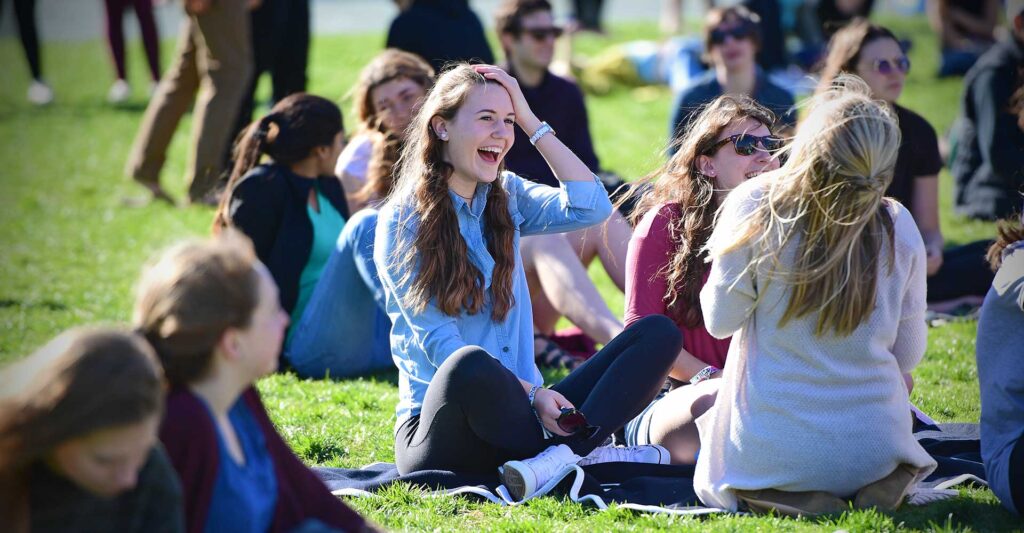
Located in the cultural hub of Saint Louis, is Washington University’s Residential Housing. While living with us in Residential Life, we want you to experience first hand what makes WashU a home. We have a continued investment in your experience that can be seen through the spirit and intentionality of our Residential Communities and our commitment to knowing each of you by name and story.
We have developed spaces and programs that foster an inclusive and diverse community, chances where you will have the opportunity to thrive, grow and learn, and where you can find your special place in community with others. Not only have we created the spaces, we have integrated professional staff, a residential curriculum, student staff, and faculty models that support your needs as a student. You are a part of the Residential Life family!!
How do we create an environment where living, learning, and leading are priority?
Our Residential Education Curriculum
Residential Life seeks to provide a safe environment that encourages learning and personal growth that empowers and challenges our residents. We utilize a residential curriculum that is based on institutional context, including our institutional values and data on resident needs; incorporates student development theory; and helps promote learning outside of the classroom and in our residential spaces.
What is a Residential Curriculum?
A residential curriculum is a student engagement model that utilizes key factors to provide necessary education and experiences to residents. A residential curriculum ensures that our programming in residential communities: incorporates relevant topics for our residents; is guided by education as a priority derived from our institutions mission; is grounded in student development and learning theories and restorative justice practices; and is sequential and targeted for varying resident populations for a well-rounded experience.
Our residential curriculum is called the Residential Education Model (REM). It activates the educational mission of the Residential Life at Washington University in St. Louis focusing on learning inside and outside of the our communities. We have the opportunity to connect with residents through intentional conversations, facilitated discussions, and be leveraging the experiences students encounter in our communities. We are guided by our University Mission Statement:
Discover and Disseminate knowledge.
To achieve our educational priority of helping students develop intellectually, grow personally, and become responsible community members, the REM has four distinct Learning Goals: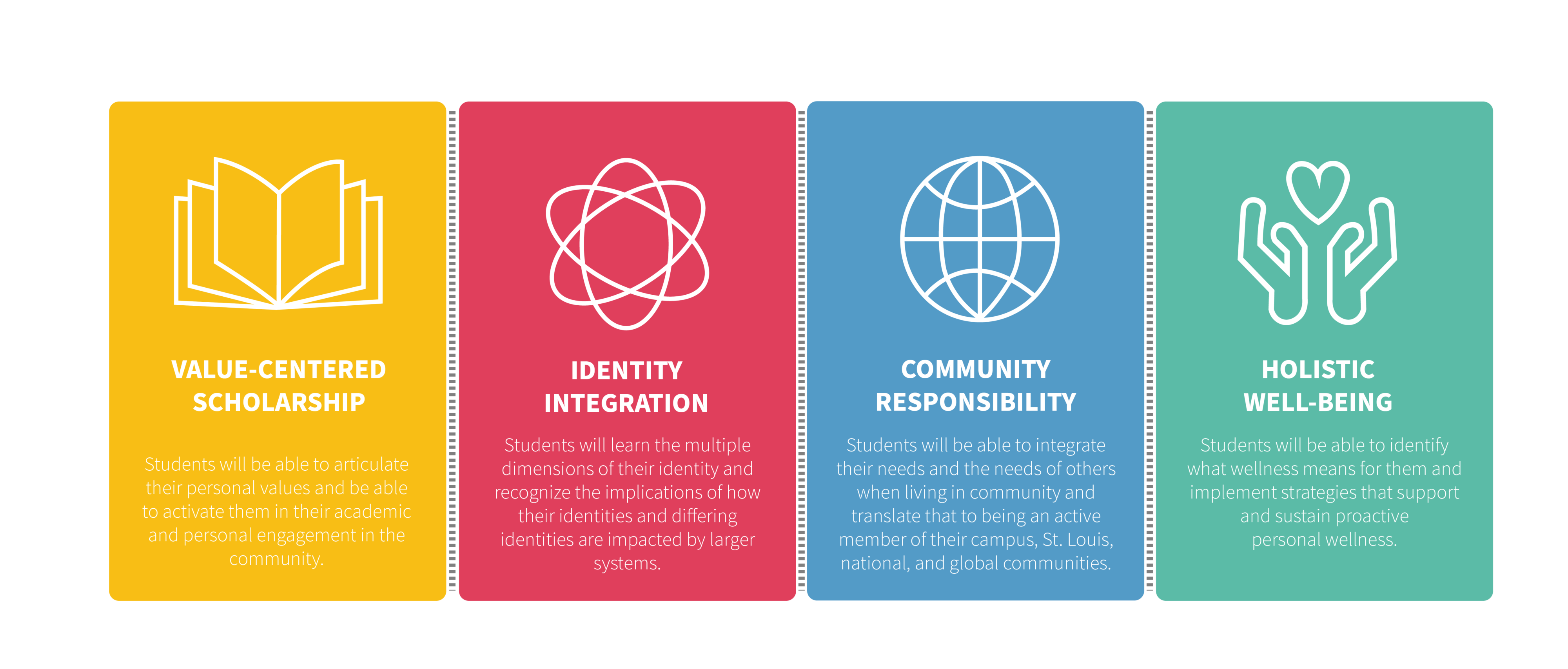
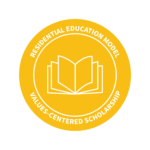
Learning Outcome: Students will be able to articulate their personal values and be able to activate them in their academic and personal engagement in the community.
Outcomes by Class Year:
| Incoming Student | 1st Year Outcome | 2nd Year Outcome | 3rd & 4th Year Outcome |
| Students will be able to recognize their personal values and academic interests. | Students will be able to explain personal values and how they connect to their actions and academic pursuits | Students will distinguish past and current influences on their values to engage further in values-based studies, activities, and experiences. | Students will be able to situationally revise values on an on-going basis and assess the impact on their professional goals. |
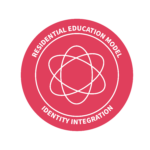
Learning Outcome: Students will learn the multiple dimensions of their identity and recognize the implications of how their identities and differing identities are impacted by larger systems.
Outcomes by Class Year:
| Incoming Student | 1st Year Outcome | 2nd Year Outcome | 3rd & 4th Year Outcome |
| Students will be able to articulate their identities. | Students will have an understanding of how identity impacts lived experiences. | Students will analyze different lived experiences’ to develop an understanding of power and privilege. | Students will be able to determine their role in and derive methods to intervene in challenging systems of power and privilege. |
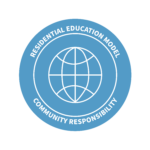
Learning Outcome: Students will be able to integrate their needs and the needs of others when living in community and translate that to being an active member of their campus, St. Louis, national, and global communities.
Outcomes by Class Year:
| Incoming Student | 1st Year Outcome | 2nd Year Outcome | 3rd & 4th Year Outcome |
| Students will be able to identify their individual needs as it relates to shared living spaces. | Students will recognize themselves as a part of a community and begin to communicate their needs and hear the needs of others. | Students will be able to distinguish the individual and collective benefits of being invested in a community and apply it to their efforts on campus. | Students will evaluate their responsibility to community and formulate ideas for future investment as global citizens. |
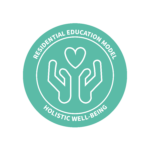
Learning Outcome: Students will be able to identify what wellness means for them and implement strategies that support and sustain proactive personal wellness.
Outcomes by Class Year:
| Incoming Student | 1st Year Outcome | 2nd Year Outcome | 3rd & 4th Year Outcome |
| Students will have a basic understanding of nutrition and physical wellness. | Students will associate health with dimensions beyond physical wellness. | Students will investigate multiple dimensions of health and analyze current behaviors. | Students will design new practices and strategies for long-term holistic wellness. |
How do we support our residential students’ development?
For each learning goal, we offer a customized engagement experience that meets students where they are at developmentally.
For example, our Community Responsibility learning goal works with students to identify their individual needs as it relates to shared living spaces. While understanding their placement as a member of a larger community, we help students distinguish between the individual and collective benefits of being invested in a community. Using this knowledge to create community on campus, our students then consciously evaluate their responsibility in their community and formulate ideas on how they plan to contribute to their local and global communities’ after graduation.
To support the learning and development of students as it relates to our learning goals, we implement strategies that use different instructional methods to accommodate the many different needs of our students.
We offer active programs, which are events facilitated by either paraprofessional (RAs) or professional staff that bring students together to learn in one space. Our live-in faculty and affiliated faculty also facilitate active programs. Live-in faculty also directly support our community-wide events, which include recurring monthly events open to everyone in a residential college/community and serve as an opportunity to foster sense of belonging to the specific community a student lives in.
Monthly newsletters, bulletin boards, and social media engagement serve as our common platforms to deliver passive programs. RAs also facilitate intentional conversations, which is an opportunity to have one-on-one conversations with each of their residents on the South Forty each semester. RAs on the Northside facilitate apartment conversations in lieu of one-on-one conversations given the community set-up and student demographic.
As you continue to get to know us here at Residential Life, we encourage you to explore our housing options and discover ways to get involved on campus within our office.